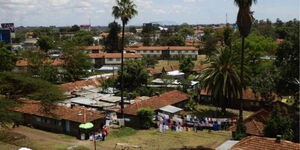A family in Westlands, Nairobi has deserted their home after a developer began construction of an adjacent apartment following Nairobi Governor Johnson Sakaja's order to remove limits on high-rise buildings.
Reports indicated that the family opted to move to a hotel after the bungalow developed cracks and began tilting.
Further, part of the perimeter wall fell the previous week moments after the construction works were initiated.
Abdi Salan, the bungalow's owner noted that efforts to arrive at a joint conclusion with the developer failed after he remained adamant about the construction. If fully constructed, Salan's bungalow will be surrounded by three high-rise buildings that have been erected in the area.
"I bought the house in 2019 and have been living there since. We have had a big problem since the construction began. I tried talking to the developer to come to a mutual agreement but it didn't succeed," he noted.
Salan added that the developer attempted to buy his property, but he declined the offer - something which the latter didn't take too kindly. The bungalow owner claimed that he received threats from the developer who insisted on purchasing the land from him.
"There was a time they indicated that they wanted to use the building as a management's office but to date, I'm not interested in selling my property. This is the genesis of all my problems," he pointed out.
Salan appealed to the relevant authorities to intervene before his house collapses due to the construction.
Following Sakaja's announcement on removing limits of high-rise buildings, critics opposed the move, pointing out that it is a recipe for disaster.
The Architect Association of Kenya (AAK) highlighted that it is against the law and poses a great risk to the environment.
“The Governor's approach blatantly disregards the correct legal procedure and good order. He should prioritise the expansion of critical infrastructure including sewerage, water, solid waste management, public transport, schools, health amenities, open grace spaces, fire and emergency services,” Florence Nyole, AAK president stated in a press briefing on March 27, 2024.
Following the uproar, Sakaja clarified that the new directive would only apply to specific zones across the city.












